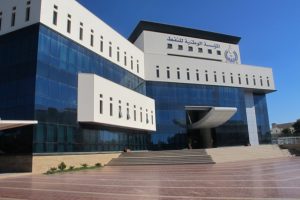By Libya Herald Reporter.

Tripoli, 31 August 2015:
Libya’s rival national oil corporations are both reaching out for support to foreign oil firms . . .[restrict]and buyers.
The internationally-recognised government’s National Oil Corporation, based in eastern Libya, has invited oil companies and buyers to a conference in Dubai later this month, while the head of its rival Tripoli-based NOC Mustafa Sanallah met companies in London at the weekend.
In a letter to oil companies, chairman of the recognised government’s NOC Nagi Elmagrabi asks for “all capable and interested international oil companies, buyers and service providers” to attend the conference at a Dubai hotel.
“The new NOC management board is fully committed to honour and discuss legally signed agreements and contracts,” Elmagrabi writes.
Meanwhile Mr Sanallah told the Reuters news agency he and Saddek Elkaber, head of the Tripoli part of the central bank, had met representatives from 26 oil firms in the British capital.
Both sides are keen to impress on foreign buyers that they are in control of Libya’s oil exports, now running at about 350,000 barrels per day, about a quarter of production before the civil war.
Last year the internationally-recognised government based in Beida and Tobruk in east Libya announced the replacement of both Sanallah and Kaber, with the new bosses recognised by Opec and the IMF.
In late March the Beida government said it wanted oil buyers to pay for Libyan oil through a Dubai-registered bank account, although most appear to be still paying through the central bank.
United Nations special envoy to Libya Bernardino Leon has called for the NOC, the central bank and the Libya Investment Authority to be “independent”, but the Beida government has not approved such a step.
The bulk of Libya’s oil exports now leaves from eastern Libya, with much of the rest being produced by off-shore terminals off western Libya’s coast.
One effect of the questions over control of the oil industry may be reluctance among buyers to purchase Libyan oil, said John Hamilton of Cross Border Information, a London consultancy. “This is going to create more uncertainty and increase the political tension.”
Elmagrabi, a 26-year veteran of Libya’s oil industry, replaced former chairman Al-Mabrook Abu Seif in August.
Abu Seif had been chairman since replacing Sanallah late last year, his appointment announced by the recognised government in the lobby of a Vienna hotel on the eve of November’s Opec conference. Abu Seif has now returned to his former job as director of computerised operations at Sirte oil company
Until being appointed chairman, Elmagrabi had been director of oil field facilities for the Benghazi-based Arabian Gulf Oil Company (AGOCO), owned by NOC, which currently produces the bulk of Libya’s oil exports from government-held fields in the east.
Since taking the chairman’s job, he has prioritised increasing production in eastern Libya and is hoping to re-open Libya’s largest oil port, Es Sider, closed by fighting in December.
Although dismissed by the Beida government, Sanallah remains in charge of the portion of the NOC located in Tripoli.
ends…. [/restrict]








